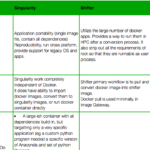Abhinav Thota, from Indiana University gave this talk at the 2018 Swiss HPC Conference. “Container use is becoming more widespread in the HPC field. There are various reasons for this, including the broadening of the user base and applications of HPC. One of the popular container tools on HPC is Singularity, an open source project coming out of the Berkeley Lab. In this talk, we will introduce Singularity, discuss how users of Indiana University are using it and share our experience supporting it. This talk will include a brief demonstration as well.”
Singularity: The Inner Workings of Securely Running User Containers on HPC Systems
Michael Bauer from Sylabs gave this talk at FOSDEM’17. “This presentation will provide an in-depth look at how Singularity is able to securely run user containers on HPC systems. After a brief introduction to Singularity and its relationship to other container solutions, the details of Singularity’s runtime will be explored. The way that Singularity leverages Linux features such as namespaces, bind mounts, and SUID binaries will be discussed in further detail as well.”
Sylabs Startup forms Commercial Entity behind Singularity for HPC
Today an HPC Startup called Sylabs entered the market to provide solutions and services based on Singularity, an open source container technology designed for high performance computing. Founded by the inventor and project lead for Singularity, Sylabs will license and support Singularity Pro, an enterprise version of the software, and introduce it to businesses in the enterprise and HPC commercial markets.
Penguin Computing Adds Support for Singularity Containers on POD HPC Cloud
Today Penguin Computing announced support for Singularity containers on its Penguin Computing On-Demand (POD) HPC Cloud and Scyld ClusterWare HPC management software. “Our researchers are excited about using Singularity on POD,” said Jon McNally, Chief HPC Architect at ASU Research Computing. “Portability and the ability to reproduce an environment is key to peer reviewed research. Unlike other container technologies, Singularity allows them to run at speed and scale.”
Greg Kurtzer of LBNL Launches SingularityWare, LLC
Over at the Singularity Blog, Greg Kurtzer writes that he has created a new organization, SingularityWare, LLC. In partnership with RStor, the new company will be dedicated to further developing Singularity, supporting the associated open source community and growing the project. “In addition to continuing my leadership of Singularity (and the new LLC), I will be maintaining my association with Lawrence Berkeley National Laboratory, as a scientific advisor as well as continuing other efforts I am associated with (e.g. Warewulf and OpenHPC).”
Designing HPC & Deep Learning Middleware for Exascale Systems
DK Panda from Ohio State University presented this deck at the 2017 HPC Advisory Council Stanford Conference. “This talk will focus on challenges in designing runtime environments for exascale systems with millions of processors and accelerators to support various programming models. We will focus on MPI, PGAS (OpenSHMEM, CAF, UPC and UPC++) and Hybrid MPI+PGAS programming models by taking into account support for multi-core, high-performance networks, accelerators (GPGPUs and Intel MIC), virtualization technologies (KVM, Docker, and Singularity), and energy-awareness. Features and sample performance numbers from the MVAPICH2 libraries will be presented.”
Video: Singularity – Containers for Science, Reproducibility, and HPC
“Explore how Singularity liberates non-privileged users and host resources (such as interconnects, resource managers, file systems, accelerators …) allowing users to take full control to set-up and run in their native environments. This talk explores Singularity how it combines software packaging models with minimalistic containers to create very lightweight application bundles which can be simply executed and contained completely within their environment or be used to interact directly with the host file systems at native speeds. A Singularity application bundle can be as simple as containing a single binary application or as complicated as containing an entire workflow and is as flexible as you will need.”
New Site Compares Docker, Singularity, Shifter, and Univa Grid Engine Container Edition
A new site developed by Tin H compares the HPC virtualization capabilities of Docker, Singularity, Shifter, and Univa Grid Engine Container Edition. “They bring the benefits of container to the HPC world and some provide very similar features. The subtleties are in their implementation approach. MPI maybe the place with the biggest difference.”









